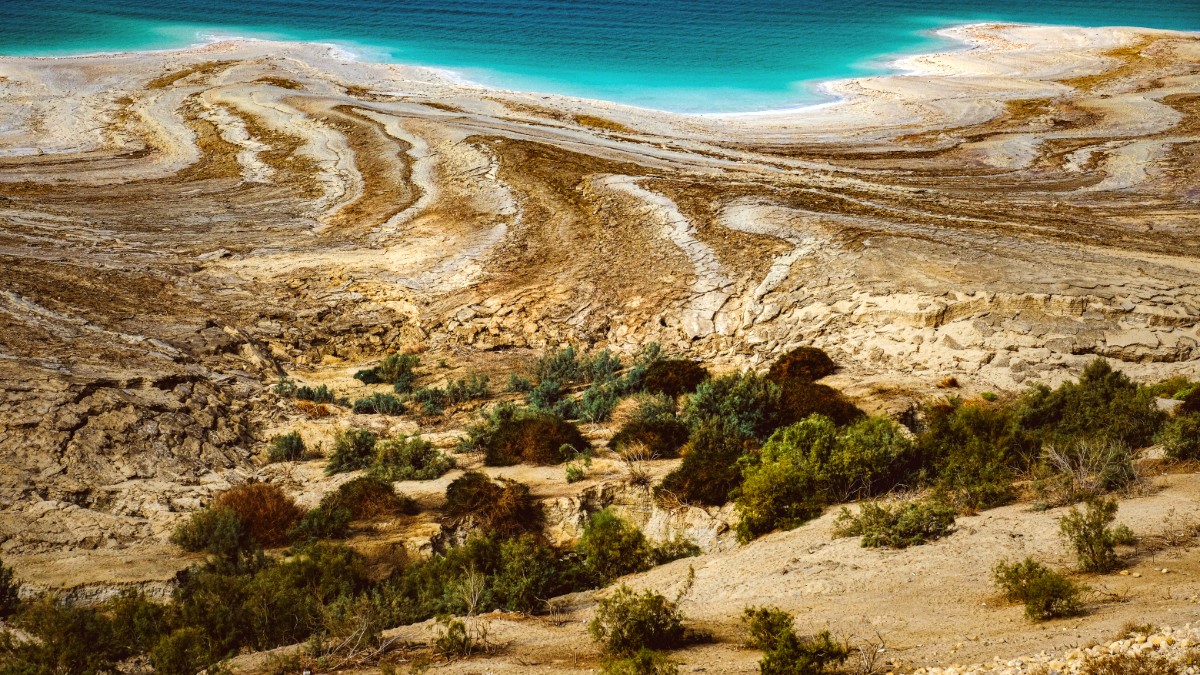
The Dead Sea And Around, Jordan
These are the most pleasant seasons, but temperatures can fluctuate. Lightweight, breathable fabrics like cotton, linen, or moisture-wicking synthetics are ideal for daytime. Long sleeves and trousers or longer skirts offer sun protection and align with modest dress codes. For evenings, bring a Light jacket, sweater, or Shawl, as evenings can become cool.
For Winter (December-February), days are mild, but evenings can be chilly. Layers are recommended. Start with lighter clothing (Long-sleeved shirts) and add a sweater or light jacket. Pack warmer clothes for evenings, including a medium-weight jacket, sweaters, and long trousers.
Wear Comfortable walking sandals, breathable Sneakers, or Walking shoes for exploring towns and historical sites. You will do a lot of walking.
Water shoes or old sandals are absolutely necessary for walking on the rocky, salt-encrusted shore. Salt crystals are sharp and can cut your feet. Do not attempt to walk barefoot.
Sturdy Hiking boots or shoes with good grip are needed for wadis (like Wadi Mujib) or nature reserves. For wet trails, Waterproof hiking sandals or shoes are a good choice.
Keeping your travel documents organized and secure is important for a smooth journey. Have both physical and digital copies.
Jordan uses 230V electricity at 50Hz. Plug types C (two round pins) and G (three rectangular pins) prevail. You may also see Type D and J. A Universal travel adapter with multiple plug options is highly recommended. Ensure your devices are dual voltage (110-240V) or bring a Voltage converter if needed. Most modern mobile phones work with local networks. Local SIM cards are available at AMM and from providers (Zain, Orange, Umniah).
Staying connected and powered up is easy with the right electronic gear. Consider your needs for communication, navigation, and capturing memories. Recommended apps for navigation, translation, and local services are listed. These digital tools enhance your travel experience and aid communication and exploration.
Use cloud services (e.g., Google Photos, Dropbox) for backing up photos and digital copies of documents.
An External hard drive provides an additional physical backup for important files.
Consider a RFID-blocking wallet for contactless card protection.
A well-stocked personal health kit prepares you for common travel ailments and the unique Dead Sea environment.
Over-the-counter medications for common issues such as Anti-diarrhea medication (e.g., Imodium), rehydration salts, antacids, and cold/flu remedies. Hydration and sun protection are key considerations in this climate.
Tailor your packing list to the specific adventures you plan to undertake.
The Dead Sea’s high mineral content can discolor or damage fabric over time. Wear an older swimsuit or one specifically for mineral water.
A small, sealable container for Dead Sea mud if you wish to take some home. This mud is available at resorts and public beaches.
These items enhance comfort, security, and preparedness during your travels.
Certain items have particular utility for the Dead Sea region. These address unique environmental factors and common traveler needs. Bringing these items can enhance your comfort and ease of travel.
Stay hydrated, minimize plastic waste.
For markets and souvenirs.
Avoid single-use plastics.
Protect fabric from salt.
Pack a spare plastic bag or a small Dry bag for your wet swimsuit after floating in the Dead Sea. The salt water makes fabrics incredibly heavy.
Consider a small, empty soft-sided bag. It has use for bringing back souvenirs and Dead Sea products that you might purchase.